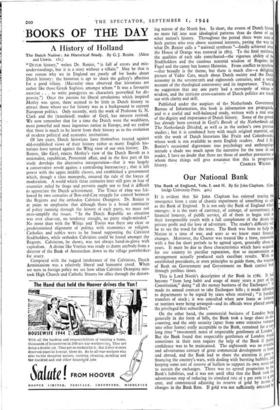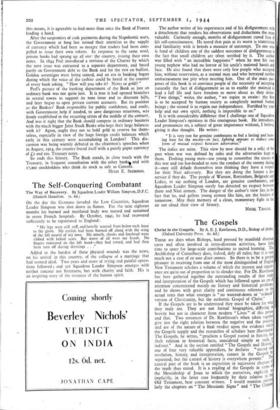Our National Bank
IT is evident that Sir John Clapham has enjoyed tracing the emergence from a state of chaotic experiment of something as safe as the Bank of England. It is not only the Bank of England which emerges : it is the story of currency, of coinage, of accountancy, cf financial honesty, of public service, all of them to begin with in their irresponsible youth with a full complement of the desire fa private profit and the love of adventure. The reader's difficulty will be to see the wood for the trees. The Bank was born to help tli! Nation in a time of war, and wars as we know exact financial changes. Moreover, the Charter was treated like a lease, renewaEe with a fine for short periods to be agreed upon, generally about zi years. It must be due to those characteristics which have acquired for our country its peculiar reputation, that so inconvenient a3 arrangement actually produced such excellent results. With no established precedents, or even principles to guide them, the reactios of Bank on Government and Government on Bank carried both through perilous times.
This is Lord North's description of the. Bank in 1781. It had become " from long habit and usage of many years a part of the Constitution," doing " all the money business of the Exchequer." It made its annual contract to take Exchequer bills ; it made advances to departments to be repaid by taxes when received,; " it handled transfers of stock ; it was consulted when new loans or lotteries or tontines were being arranged—and its officials were placed among the privileged first subscribers."
On the other hand, the commercial business of London being generally in the form of bills, the Bank took a large share in clis' counting, and the only security (apart from some tentative ventures into other forms) really acceptable to the Bank, remained for a yell long time " two-month notes of respectable gentlemen of London But the Bank found that respectable gentlemen of London wow° sometimes in their turn require the help of the Bank if public confidence was to be maintained. The eighteenth was an eventful and adventurous century of great commercial development at home and abroad, and the Bank had to share the attention it gave t financing the country's wars, with dealing with 'bursting bubbles, and keeping some sort of reserve of bullion to support its own notes aaa to sustain the exchanges. There was no agreed propbrtion to the Bank's liabilities, and it was not until 1822 that the Bank took the adventurous step of reducing its standard rate of 5 per cent to 4 Pa f cent, and commenced adjusting its reserve of gold by means o changes in the Bank Rate. If gold was not sufficiently attracted hi this means, it is agreeable to find more than -once the Bank of France lending a hand.
After the suspension of cash payments during the Napoleonic wars, the Government at long last turned their attention to the supply of currency which had been so meagre that traders had been com- pelled to issue their own tokens. In response to the same need, private banks had sprung up all ove - the country, issuing their own notes. In 1844 Peel introduced a revision of the Charter by which the note issue was entrusted to a separate department, and based partly on Government debt to the Bank and for the rest on bullion. Golden sovereigns were being coined, and an era in banking began during which the voice of the cashier could be heard at the counter of every bank asking . " How will you take it? Notes or gold? "
Peers picture of the banking department of the Bank as just an ordinary bank was not quite just. It is true it had opened branches in several towns to support its note issue and to discount bills, and later began to open private current accounts. But its position as the Bankers' Bank responsible for public confidence, and ready, with Government help if needed, to save dangerous situations, was firmly established in the recurring crises of the middle of the century. And was it right that the Bank should compete in ordinary business with the much bigger Joint Stock Banks who kept their large balances with it? Again, ought they not to hold gold in reserve for them- selves, especially in view of the huge foreign credit balances which early in this century were accumulating in London? This dis- cussion was being warmly debated in the chairmen's speeches when in August, 191,4, the country found itself with a purely paper currency of Li and los. Treasury notes.
So ends this history. The Bank stands, in close touch with the Treasury, in frequent consultation with the other bank and with . 17,00o stockholders who think its stock as safe as Conso s.
HUGH E. SEEBOHM.



























 Previous page
Previous page